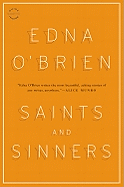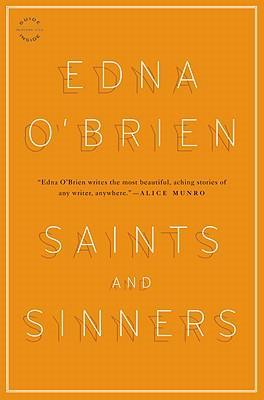
 Joyce, Trevor, Toíbín. One could be forgiven the belief that all of the
greatest Irish short story writers are men. But a few hours with Edna O'Brien's
latest collection, most of them set in her homeland, is the ideal antidote to
that unwarranted conclusion.
Joyce, Trevor, Toíbín. One could be forgiven the belief that all of the
greatest Irish short story writers are men. But a few hours with Edna O'Brien's
latest collection, most of them set in her homeland, is the ideal antidote to
that unwarranted conclusion.
One of O'Brien's preoccupations in the 11 stories of Saints and Sinners is the frictions that arise from Old World class differences. In "Inner Cowboy," she tells the story of Curly, a simple young man who's a witness to an environmental accident and soon becomes ensnared in the effort to conceal it. "Green Georgette" is the wickedly funny account of a disastrous afternoon tea a village woman and her daughter attend as guests of the local banker's pretentious wife. Uneasily waiting in an upscale Dublin hotel for the arrival of a famous poet, librarian Miss Gilhooley muses in "Send My Roots Rain" on "the changes that had occurred in their country, changes that were not for the better. Money, money, money. The rich going to lunch in their helicopters, chopping the air and shredding the white mist."
Though the personal dominates over the political in these stories, O'Brien doesn't refrain entirely from exploring a subject that's an unfortunate fact of Irish life. "Black Flower" obliquely touches on Ireland's history of sectarian violence ("the long grim chain of reprisals") through the tale of an IRA fighter who was a "young invincible buccaneer" when he entered prison and now appears "aging and dredged, everything locked inside him" to the woman who taught him painting there and with whom he's begun a relationship.
Not all of O'Brien's stories follow a conventional path, as in "Madame Cassandra," the stream of consciousness rant of a woman on the way to consult a fortuneteller, seeking to confirm the depth of her husband's infidelity. "Plunder" is a brief, terrifying portrait of a group of children who find themselves at the mercy of an invading army.
The collection closes with two strong stories that share the theme of family schisms and illustrate O'Brien's skill when it comes to matters of the heart. "My Two Mothers" sketches the conflict between a mother who "insisted that literature was a precursor to sin and damnation" and her daughter, a writer who "believed it was the only alchemy there was." In "Old Wounds," one cousin traces the course of a family feud, realizing in the midst of it that "with so many dead, there was no need for estrangement anymore."
Marrying deceptively simple prose to the gift of keen insight into the lives of her complex characters, Edna O'Brien reaffirms her place in the company of Ireland's most esteemed writers. --Harvey Freedenberg
Shelf Talker: In her latest collection, Edna O'Brien shows she's every bit the equal of some of Ireland's short story masters.

